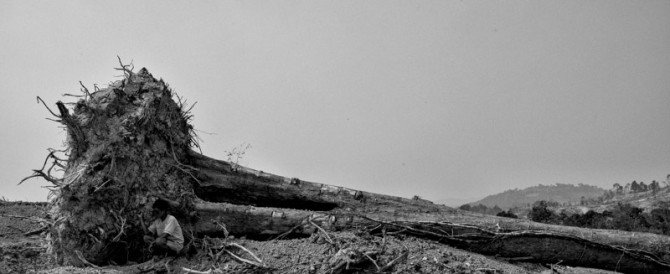2014 didn’t start well for the International Finance Corporation (IFC), the private lending arm of the World Bank. Its money is supposed to help underwrite the Bank’s lofty aim to end extreme poverty. However, recent revelations suggest that its monitoring system is struggling to tell the difference between development, destitution and destruction.
On 10th January, its Office of the Compliance Adviser (CAO) issued a damning audit of a US$30 million loan given by the International Finance Corporation (IFC) to Grupo Dinant, a Honduran palm oil company. The conclusions could not have been clearer – the IFC had failed to follow its own environmental and social rules when it invested in Dinant in 2009. It then failed to take action when the company was accused of multiple assassinations and other human rights abuses.
Exactly one month later, indigenous communities in Cambodia submitted a complaint to the IFC against its financing of a Vietnamese company Hoang Anh Gia Lai (HAGL). The company owns large plantations in Cambodia and, according to local villagers, is responsible for environmental and human rights abuses. HAGL receives funds from the IFC and other international investors through the equity fund Dragon Capital, as first exposed in our May 2013 report Rubber Barons. On 24th February, the CAO confirmed the complaint met its criteria and that it would now assess the situation on the ground. Watch this space.
“We want the World Bank to know that its money is being used destroy our way of life. Nowadays, we are surrounded by companies. They have taken our community lands and forests. Soon we fear there will be no more land left for us at all and we will lose our identity. Does the World Bank think this is development?” - Sal Hneuy, representative of one of the Cambodian communities behind the complaint.
HAGL also has large plantations across the border in southern Laos, where communities tell a familiar story of human rights violations, forest destruction and food insecurity. However, following a recent spate of arrests and the disappearance of a prominent member of Lao civil society, international and Lao NGOs feel under too much pressure to support the affected communities to also submit a complaint to the IFC.
Both the Dinant and HAGL cases highlight the inability of the IFC to track where its finances end up or to take action when things go wrong. Which in turn raises some pretty big questions over how it can know if its money is actually helping or hindering development.
Its investments in HAGL were made through financial intermediary Dragon Capital, a level of detachment which some claim explains the lack of oversight. But it doesn’t explain how no-one from Dragon Capital, the IFC – or any of HAGL’s other investors– appear to have noticed that in 2011 the company publicly admitted that its plantations in Cambodia and Laos didn’t have the correct permits and licenses. And it doesn’t change the fact that World Bank money was used to fund land grabs and human rights abuses in a country that desperately needs the development the Bank is supposed to deliver – so the system is not working.

Depressingly, these cases are far from unique. In 2013, the CAO released the results of an audit of the social and environmental outcomes of the IFC’s lending through financial intermediaries. The conclusions of the audit are that the IFC is failing to assess whether its environmental or social standards are successful in “doing no harm”, so the Bank has very little understanding of the potential impacts of its investments.
This problem is systemic, and must be treated as such – land grabs and deforestation will continue unless investors who should know better stop financing unscrupulous companies. The World Bank, of all institutions, must take responsibility. Rather than ad hoc responses to individual catastrophes once the horse has bolted, it must face the fact that its investment model is damagingly flawed, and carry out root and branch reforms to fix it. That means not just stopping direct investment in companies it shouldn’t be touching with a bargepole, but supporting governments and civil society to build fairer, genuinely sustainable approaches to land and forests.
Megan Macinnes is the Head of the Global Witness Land Campaign. Watch our “Rubber Barons film here: http://youtu.be/3epqpR9OBhY